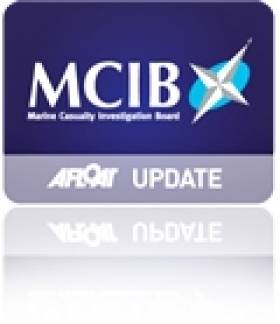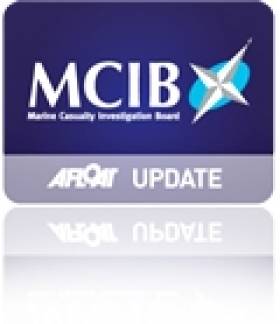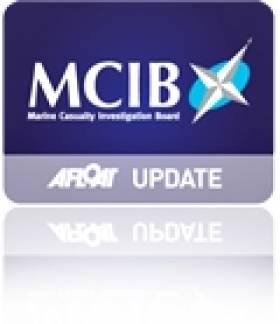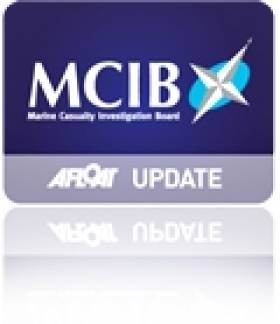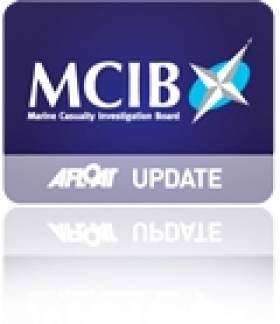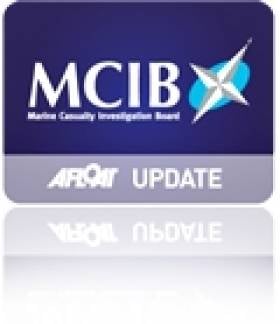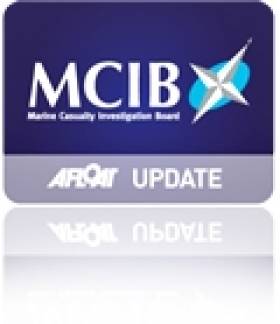Displaying items by tag: MCIB
Dinghy Drowning Report Blames Poor Planning
#MCIB - Marine investigators have reiterated the importance of boaters informing people ashore of planned trips in their report into the drowning of a dinghy sailor in West Cork last autumn.
As reported last August on Afloat.ie, an afternoon sail by a father and son from the Beara Peninsula ended in tragedy after their Enterprise sailing dinghy capsized.
The body of John O'Leary from Allihies was found around 1.30am on Tuesday 14 August, just hours after he and his 18-year-son Christy had abandoned their overturned vessel to attempt the swim to shore.
The official report by the Marine Casualty Investigation Board (MCIB) found that the two had been sailing without incident in the area between Cod's Head and the Cullogh Rock for an hour or so before a gust of wind flipped their dinghy.
Unable to right the vessel, the O'Learys rested on the upturned hull to await assistance. But after many hours had passed and suspecting that the hull was starting to sink, they decided to swim to the shoreline some 800 metres away.
With 200 metres to go, John O'Leary encouraged his son to swim ahead to raise the alarm, which he did minutes later. But in the interim John went missing.
Some time into the search operation launched immediately by Castletownbere RNLI and assisted by the Irish Coast Guard from Allihies, John O'Leary's lifejacket was found in the water, and his body was located shortly after.
The MCIB report found that the Enterprise dinghy the O'Learys were sailing is of a kind notorious for its difficulty to right after capsizing. It was also noted that the craft had an insufficient buoyancy bags, which made it even more difficult to bail out once overturned.
But more importantly, the report found that John O'Leary, as skipper of the dinghy, had not arranged a return time or sailing area with anyone on shore prior to the trip.
"If he had done this, the rescue may have occurred before they decided to enter the water," the report said.
Neither man was wearing a wetsuit, exposing them to "the cold and stresses from the cold" which may have "impaired their decision making process" and prompted their decision to swim from the vessel, it added.
In its recommendations, the MCIB advises all sailors to inform a responsible person ashore of their itinerary, and to stay with their vessel as long as possible in the event of any incident on the water.
The full report into the dinghy capsize is available to download below.
Loss of Buoyancy Led to Drowning of Lady Eileen Crew - MCIB
#MCIB - Overloading of the boat deck and a missing hatch at the stern may have caused a fatal loss of buoyancy that led to the drowning of two fishermen off Co Clare last year, according to the official report into the incident.
As previously reported on Afloat.ie, the remains of the two fishermen were found by local divers at the wheelhouse of their sunken boat near Spanish Point on 14 August 2012 during a search operation for the fishing vessel Lady Eileen.
Their craft had been reported missing the previous day after they failed to return from a trip to mend snagged nets, and a massive search operation was mounted after debris and diesel were discovered in the water close to Spanish Point that evening.
The two men lost were later named as owner/skipper Michael Galvin and crew Noel Dickinson, both of Quilty in Co Clare.
In its official report into the incident, the Marine Casualty Investigation Board (MCIB) found that the vessel had a low freeboard, such that even in an unladen condition it would not have to heel by a significant degree to take water on the deck.
With the weight of nets and the seawater tank used to store crustaceans, the vessel's freeboard was reduced such that water would be allowed to "flow freely on to the deck even in very calm weather conditions". This is water that would not be quickly released, with potentially very serious effects on the craft's buoyancy.
In addition, a panel removed by Galvin some weeks before to do repair work on the sterngear appeared not to have been replaced, possibly allowing a catastrophic amount of water on deck if the boat encountered wind or wave action.
With no witnesses to the incident it is unknown exactly what happened to cause the boat to be swamped, though it is thought to have transpired very quickly as neither man was wearing a lifejacket and the boat's manually operated emergency beacon in the wheelhouse was not activated.
Among the MCIB's recommendations is that the Minister for Transport reviews the Code of Practice for fishing vessels under 15m to devise new stability criteria.
Volunteers participating in search operations have also been urged to co-ordinate their assistance, after an open boat with three on board was capsized by waves while searching for the Lady Eileen and its crew.
All were thrown overboard though were quickly rescued by Garda divers in the area.
The full report from the MCIB is available to download below.
Tit Bonhomme Inquest Criticises 999 Service
#TitBonhomme - The "extraordinary" lack of information solicited by the operator who took the first of two emergency calls from the sinking Tit Bonhomme has been taken to task at the inquest into the loss of the trawler's crew.
The Irish Times reports that it only emerged last week that two emergency calls were made from the vessel by its youngest crew member Kevin Kershaw, though the Irish Coast Guard and the Marine Casualty Investigation Board (MCIB) were previously aware of only one.
The first - and previously unreported - 999 call from Kershaw's mobile phone at 5.46am was transferred to Bandon Garda Station rather than to the coastguard. Barrister Elizabeth O'Connel, representing the widow of skipper Michael Hayes, described the dearth of details taken by the operator on that call as "extraordinary".
It was only on the second call placed three minutes later that the Irish Guard was notified of the incident by 5.53am.
The Department of Communications has since announced it will conduct a review of the 999 service provided by the Emergency Call Answering Service (Ecas), operated by BT Ireland from Ballyshannon, Navan and Dublin.
As previously reported on Afloat.ie, five fishermen lost their lives when the trawler Tit Bonhomme went down after striking rocks at the mouth of Glandore Harbour.
The only survivor, Abdelbaky Mohamed, gave testimony to the inquest two weeks ago of his last moments aboard the stricken vessel.
#TitBonhomme - The inquest into the Tit Bonhomme tragedy has heard testimony from the sole survivor of the incident that took the lives of five fishermen.
As The Irish Times reports, Abdelbaky Mohamed explained how he and three other crew had been asleep below deck their trawler hit Adam Island at the mouth of Glandore Harbour on the morning of 15 January 2012.
Mohamed said there was no 'big bang' when the vessel hit the rocks but it began taking on water very quickly has he, his brother Wael, Attia Shaban and Kevin Kershaw made their way to the bridge to join Saied Ali Eldin and skipper Michael Hayes.
The boat was rolling in heavy seas as Hayes handed out lifejackets to each crewmen which they then put on, he recalled, adding that conditions made it impossible for them to put on their immersion suits.
The Irish Independent has published a harrowing transcript of the crew's frantic calls to the emergency services as the Tit Bonhomme was assaulted by the waves and eventually capsized.
Mohamed said his lifejacket was ripped from his body by the force of the water crashing into the bridge, but he was able to grab onto it to reach the surface and swim towards the shore, where he was found by a search party two hours later.
Last month's report by the Marine Casualty Investigation Board (MCIB) found that crew fatigue was "the single overriding casual factor" that contributed to the tragedy, pointing out that the crew had less than five hours' sleep during their 40-hour fishing trip.
But Mohamed told the inquest that he had had sufficient rest at the time of the incident.
The Irish Times has more on the story HERE as the inquest continues.
The Department of Transport, Tourism & Sport has accepted all five recommendations from the MCIB report in the 2012 sinking of the Tit Bonhomme trawler published today.
The Irish Registered motor fishing vessel "MFV Tit Bonhomme" left Union Hall, Glandore, Co. Cork on Friday the 13th of January 2012 on a fishing trip with a crew of six. The vessel experienced some technical difficulties during the fishing trip and the Skipper decided to return to port. On its return to the port of Union Hall in the early morning of the 15th January 2012 the vessel stranded on Adam's Island at the entrance to Glandore Harbour. The vessel broke up with the loss of five of its six crew.
The full report is available to download as a 6mb PDF document here.
The recommendations serve to highlight the importance of adopting a rigorous safety culture at sea. All five recommendations have either been implemented or are in the process of being implemented.
The Department of Transport, Tourism & Sport has today published its response to the Marine Casualty Investigation Board (MCIB) report into the sinking of the Tit Bonhomme.
The purpose of an MCIB report is to investigate a marine incident, and to make recommendations to the Minister in order to prevent a recurrence. The MCIB's independence from the Department is enshrined in law.
The Department's response to the five safety recommendations contained in the report is as follows:
6.1 That the Minister for Transport, Tourism and Sport enforces the European Community (Workers on board sea-going fishing Vessels) (Organisation of Working Time) Regulations, 2003 (S.I.709 of 2003).
6.2 That the Minister for Transport, Tourism and Sport enforces the Merchant Shipping (Safety of Fishing Vessels) (15-24 Metres) (Regulations) S.I. No. 640 of 2007 in relation to musters and drills.
The Department introduced an updated fishing vessel logbook for Irish registered fishing vessels of 25 tons or upwards from the January 1st 2013. Use of the logbook is being enforced at vessel surveys and inspections addresses, generating a safety management culture on-board Irish registered fishing vessels.
6.3 That the Minister for Transport, Tourism and Sport considers amending the requirements to provide for the automatic change-over of electrical power supplies for the radio installation in the event of an emergency.
The cost of technology to provide an automatic switch-over is now available at a reasonable price to vessels. Reference to this technology is being included in the next revision of SI(2007) 640 and fishing vessels will be required to adopt the technology when they fall due for survey.
6.4 That the Minister for Transport, Tourism and Sport considers the possible fitting of Bridge Navigation Watchkeeping Alarm Systems (BNWAS) on-board fishing vessels.
The Department fully supports fitting vessels with these systems. BNWAS is already mandatory for cargo ships and passenger ships. An Bord Iascaigh Mhara is proposing to provide funding for the voluntary fitting of these systems, which are mainly relevant for fishing vessels greater than 15m length overall.
6.5 That the Minister for Transport, Tourism and Sport considers issuing a Marine Notice drawing Owners/Skippers attention to the necessity for Skippers encountering situations where the safety of the vessel and its crew are potentially put at risk to alert the appropriate shore authorities advising them of the situation and what assistance the vessel may require.
The Department will shortly issue a Marine Notice to address this recommendation.
Minister for Transport, Tourism & Sport Leo Varadkar said: "I want to extend my sympathies to families and friends of the deceased. We owe it to them and everyone using the sea to embrace a culture of safety at sea and ensure that similar incidents do not re-occur in the future. I also want to thank the MCIB for its thorough investigation."
#MCIB - Investigators have reiterated the importance of water safety measures such as wearing a lifejacket and having a means of alert when on or near the water in the report into the death of a man in Dundalk Harbour in February last year.
As previously reported on Afloat.ie, the man was understood to have taken a small punt from the mudflats at Soldiers Point to reach a colleague requiring his aid on another boat on the afternoon of Saturday 12 February 2012, but went missing after he capsized near Dundalk Lighthouse.
The official report into the indecent by the Marine Casualty Investigation Board (MCIB) names the man as Stephen Fergus, who was making his way to assist his friend Pat O'Brien, whose boat was suffering engine trouble and was anchored on the north side of the estuary at Dundalk Harbour.
Fergus was reported missing after O'Brien became concerned as to his whereabouts. After an extensive search of the estuary by the emergency services, Fergus' body and the submerged punt were found later that evening by the Drogheda unit of the Irish Coast Guard.
The subsequent post-mortem recorded Fergus' death as by drowning.
With no witnesses to the incident that brought about his death, it is assumed that Fergus was in the process of either getting into the punt or transferring from the punt to his own boat when the tragedy occurred.
It was noted that the canvas cover on his boat has not been disturbed, indicating that he did not gain access to the vessel before the incident.
The report's analysis concludes that the strong tidal current at the time would have made it difficult for Fergus to manoeuvre the punt to transfer to his boat single-handedly.
In addition, the condition of the mudflats where the punt was tied off were found to be changeable over time, with the mud in parts "arduous to walk on".
But the key finding of the investigation was that Fergus was neither wearing a lifejacket nor had any means of communication on his person at the time of the incident.
Two lifejackets were found in his car, and it was noted that he had left his mobile phone at home, presumably in the hurry to assist his friend.
The MCIB recommended that all owners and operators of recreational craft should be aware and follow the Code of Practice for the Safe Operation of Recreational Craft.
The full report is available to download as a PDF below.
Nighttime Navigation Issues Led to Grounding of 'Pirate Queen' - MCIB
#MCIB - "Serious weaknesses" in navigational procedures and practices led to the grounding of a passenger boat at Roonagh Pier in Co Mayo last winter, according to the official report into the incident.
The inter-island passenger ferry Pirate Queen - operated by Clare Island Ferry and Clew Bay Cruises Ltd - grounded on rocks at the entrance to Roonagh Pier on the evening of 20 December 2011 as it made a nighttime approach to the pier.
Two crew were joined by three passengers on board at the time, one of whom served as auxiliary crew while another was injured when the vessel was jolted in heavy swell. The vessel itself, though not holed, sustained severe structural damage.
It emerged that the navigational aid lights on the pier - maintained my Mayo County Council - were not fully functioning at the time of the incident and did not illuminate the waters in the vicinity of the pier, making any approach in darkness a dangerous one, particularly at a location where swells were common at the best of times.
However, the Pirate Queen continued on its heading to Roonagh Pier despite its master being made aware of the lighting issue via SMS shortly after leaving Inishturk.
On approach is was noted that the search light was not manned, and when the lookout reported that the vessel was too far to the east, a large swell forced the boat onto rocks on the east side of the pier.
Lifejackets were immediately put on the passengers, while a fellow ferry master returning home on his RIB was hailed to quickly retrieve the passengers from the boat.
As the ferry was rolling and grinding on the rocks in the heavy swell, one of the passengers was thrown against a bulkhead or the hull and suffered a back injury, though luckily avoided head injury due to the lifejacket. All three passengers were transferred ashore safely via RIB.
In its findings, the Marine Casualty Investigation Board (MCIB) initially focused on the pier lighting, both high-level and navigation lights, noting their vulnerability to storm damage and the lack of effective screening.
But upon further analysis, the report highlighted a number of deficiencies in the running of the ferry service itself, such as the lack of crew rosters to ensure a full complement for any sailing, and the absence of an alternative plan in the event of difficulties landing at Roonagh Pier.
In addition, it noted "an over-reliance of visual aids to navigation and a neglect to practice and use the electronic aids on board.
"When one is very familiar with the waters and on regular passages it is very easy to become complacent," the report stated.
It also noted the "hazardous and unacceptable" decision following the incident to move the boat from Roonagh Pier to Clare Island without informing the Irish Coast Guard of the situation.
The MCIB recommends that the ferry operators devise specific approach instructions, ensure that all employees take part "in the full range of emergency procedures" and that crew rosters be drawn up and displayed. The complete report is available to download below.
Man Lost Arm After Going Overboard from RIB In Cork Harbour
#MCIB - A man who lost his arm when he fell overboard from his boat in Cork Harbour last summer could have avoided the accident if he had followed essential safety precautions, according to the official report into the incident. The full report is available to download below as a PDF document.
Owen Corkery of Carrigaline was the subject of a 'miracle rescue' on 9 June 2012 when he was thrown overboard from his RIB, which subsequently struck him several times after he entered the water near Haulbowline Island, causing serious injuries to his head, back and left arm.
As previously reported on Afloat.ie, the RNLI said Corkery was "incredibly lucky to have been spotted from the shore" by a man now known to be Paul Bryans, who had been looking through a telescope at Fort Camden in Crosshaven approximately a mile away from the site of the incident.
Bryans and colleague Dick Gibson immediately raised the alarm with the emergency services and Crosshaven RNLI respectively, and rescue crews were dispatched within minutes.
While the lifeboat volunteers took control of the wayward RIB, Corkery was quickly retrieved from the water by the crew of the Cork Harbour Pilot boat Sonia. They found him incoherent and bleeding heavily, and also noted that while he was wearing a working personal flotation device (PFD), he was not wearing warm clothes or shoes.
Corkery was transferred via ambulance to Cork University Hospital, where his left arm was later amputated just above the elbow due to the severity of his injuries.
According to the official report into the incident by the Marine Casualty Investigation Board (MCIB), the RIB was found to be undamaged but had no CE or other approval mark.
The kill cord on the boat's motor was also found to be malfunctioning, as the engine could be started whether or not it was attached, and did not shut off when removed.
The report states that Corkery - an experienced powerboat user who had not completed any recognised handling course - has since explained he was aware of the kill cord malfunction but continued to use the vessel.
He confirmed in the same interview with investigators that he was standing beside the helm of the RIB at the time of the incident, a position that "would have made him considerably more likely to be thrown from the vessel".
Investigators also found it likely that Corkery's lack of shoes would also have reduced his grip while standing on the floor of the RIB.
In its conclusions, the MCIB report - which is available to download below - emphasises that the kill cord is an "essential part of safety equipment for all open motorboats" that should always be used and checked regularly, and that the helm of any high-speed watercraft should always remain seated, even at low speeds.
It also recommends that all pleasure craft owners should complete a recognised powerboat handling course.
Neglect of Safety Procedures Led To Leg Injury on Fishing Vessel - MCIB
#MCIB - The dangers of performing maintenance tasks on boats while machinery is running have been highlighted in the official investigation into an accident on a fishing vessel off Erris Head in Co Mayo last year.
The skipper of the MFV James Collins was seriously injured when his leg was caught in the vessel's propeller shaft while attempting to clear debris from the bilge pump on the morning of 20 April 2012.
Jonathan O'Donnell, aged 26 at the time, suffered significant soft tissue damage to his left leg and broke his trivia, fibia and ankle in the incident. Luckily the leg did not require amputation and he is expected to make a full recovery.
The report into the incident by the Marine Casualty Investigation Board (MCIB) found that the vessel's bilge pump was located in the hold adjacent to the propeller shaft, with access to both prevented by the same covering boards.
When O'Donnell responded to a persistent bilge alarm, he did not put the engine on stop or into neutral and the propeller shaft remained turning when he removed the covering boards to access the pump.
As he put his foot into the bilge beside the shaft in order to reach down and clear debris, his waterproof leggings were caught by the coupling on the shaft and his leg was round around it twice.
The MCIB noted the quick actions of the vessel's crew and the prompt attendance of RNLI lifeboat and Irish Coast Guard helicopter crews as instrumental in O'Donnell receiving swift treatment and not losing his leg.
However, the report also pointed to a lack of attention to proper safety precautions on board, nothing that the skipper was "too intent on solving the bilge pump problem" and that he "neglected basic safety procedures" by not stopping all machinery before accessing the bilge as set out in the Code of Practice for Fishing Vessels.
The report concluded that the "ease with which debris could enter the bilge and block the pump suction" was a contributing factor to putting the skipper in his predicament at the time, and also referenced the ease with which loose-fitting clothing like waterproofs can be snagged on turning machinery.
Moreover, the screening of the propeller shaft by covering boards also used to access the bilge pump did not present adequate protection "enabling it to be easily exposed and present a hazard".
The MCIB recommends that the Code of Practice be amended to highlight the danger of accessing the bilge area when shafts are rotating, and to include assessment of sole boards in fish holds to prevent debris passing through to the bilge tank. The complete report is available to download below.
Marine Notice: Casualty or Incident Reporting
#MarineNotice - The latest Marine Notice from the Department of Transport, Tourism and Sport (DTTAS) reminds all mariners of the obligation to report marine casualties to the appropriate authorities in the event of an incident.
The notice refers to the official report by the Marine Casualty Investigation Board (MCIB) into the grounding of the cargo ship Pantanal (more details) at Rossaveal on 31 March 2011, which can be read in full HERE.
The report recommends that mariners be reminded of the European Communities (Vessel Traffic Monitoring and Information System) Regulations 2010, as amended, which require the operator, agent or master of a ship in Irish waters to immediately report to the Irish Coast Guard any incident affecting the safety of the ship, or any incident liable to lead to pollution of the waters around Ireland or any other EU member state.
Full details are include within Marine Notice No 3 of 2013, a PDF of which is available to read or download HERE.


























